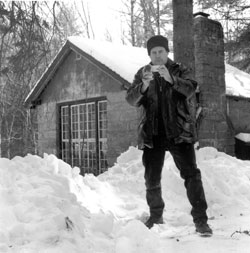CAST AWAY
American Independents visit the MacDowell Colony
"IT REALLY WAS," says independent filmmaker Scott Saunders, "one of the most extraordinary things I have ever done in terms of my creative life."
Saunders, the director of The Headhunter’s Sister, is talking about his recent stay at the MacDowell Colony (www.macdowellcolony.org) — the Peterborough, New Hampshire artists’ colony which bills itself as the oldest and largest in the country. What is it about the place that merits such high praise? Put it this way: if a vacation is about getting away from work so you can really live, a stay at MacDowell turns that notion on its head: it’s a chance to get away from day-to-day life so you can really work.
The idea is simple. You get a private studio in the woods, three meals a day, and no interruptions. Partners and pets aren’t allowed, and the studios don’t even have telephones. By day, it’s just you and your project of choice. By night, you’re in the company of artists from a broad range of disciplines, all of whom are locked in their own high-intensity tango with the muses. You eat dinner, you talk about how your work is or isn’t going, or you stay perfectly silent, if that’s what you prefer. And, if you’re like Saunders, you get humiliated at the colony’s pool table by your fellow campers.
 |
| Film and Video artist Scott Saunders
at the MacDowell Colony. |
The MacDowell Colony was founded in 1907 by composer Edward MacDowell and his wife Marian. Former residents have won more than 50 Pulitzer Prizes and seven MacArthur "Genius" Awards — not to mention Academy Awards (director Jessica Yu is one recent winner). Today, MacDowell covers 450 acres and operates year-round. It maintains 32 studios, each designed for a specific artistic discipline, with most attendees sleeping in one of three separate residences. Breakfast and dinner are served in a main dining room. Lunch, on the other hand, arrives quietly at the studios in MacDowell’s signature picnic baskets, so as not to disturb artists at work.
And with everyday distractions stripped away, projects can take off. Saunders used his time at the colony to hone the script for his feature, The Technical Writer, which goes into production in January. "At MacDowell, I had five completely uninterrupted weeks to just focus on writing," he says. "It allowed me to get much more done than I normally would in the distracting environment in which I live — New York City."
He’s not alone. "The amount of work you can get done in one month at MacDowell," says director Alex Sichel (All Over Me), "is equal to five months in the real world."
Not that the colony is a pressure cooker. There’s no obligation to show your work at the end of your stay. And filmmakers rave about the non-competitive environment in which contact with people from other fields reminds all that creative life can be tough for everyone, even the most talented. The result can be liberating, as Sichel found when she left for MacDowell with a touch of writer’s block. "Everything changed," she says. "I was suddenly able to move forward."
More than 200 artists receive residencies at MacDowell each year. Film and video applicants send two samples of their work on VHS tapes, or — in the case of scriptwriters — three copies of a single script with a treatment. The applications are reviewed by an admissions panel with expertise in the artist’s discipline. Residents pay only what they can afford toward the cost of their stay, and fees are voluntary.
But MacDowell, of course, is just one option available to film- and video-makers. The Alliance of Artists’ Communities (www.artistcommunities.org) has information on U.S. residencies; Res Artis (www.resartis.org) is the Alliance’s international counterpart.
For those applying to a residential program, MacDowell executive director Cheryl Young recommends making note of the program’s expectations — such as work requirements, or limits on family and spouses. And bear in mind that colony life isn’t for everyone. The long hours of silence and isolation drive a few people up the studio wall, and the community’s chemistry changes as participants come and go.
But for most, the experience is profoundly enriching. "A residency at MacDowell is the next best thing to having a country estate," says director Michael Almereyda (Hamlet), who has stayed at the colony twice. "Each time I felt incredibly at home, wrote a screenplay from start to finish, and returned to New York asking myself a startling question: Why not move to New Hampshire?" – Rod L. Huntress
VOD CALENDAR


 See the VOD Calendar →
See the VOD Calendar →


